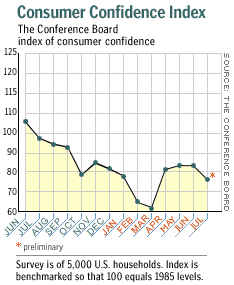NEW YORK (CNN/Money) - Consumer confidence in the U.S. economy tumbled in July, a research group said Tuesday, dashing Wall Street hopes for a gain.

The Conference Board, a business research group based in New York, said Tuesday that its closely watched index of consumer confidence sank to 76.6 from 83.5 in June. Economists, on average, expected confidence to rise to 85, according to a Reuters poll.
The Conference Board's "expectations" index, which measures how consumers feel about the future, fell to 86.4 from 96.4 in June. The "present situation" index dropped to 61.9 from 64.2.
"The rising level of unemployment and sentiment that a turnaround in labor market conditions is not around the corner have contributed to deflating consumers' spirits this month," said Lynn Franco, director of the Conference Board's Consumer Research Center. "Expectations are likely to remain weak until the job market becomes more favorable."
On Wall Street, stock prices fell and Treasury bonds tumbled, sending the yield on the 10-year note to its highest level in nearly a year, on the news.
The news conflicted with recent reports showing some improvement in the broader economy, which has struggled to recover from a recession in 2001. Particularly hard-hit has been the labor market.
(For more on how the drop in consumer confidence may affect the economy and the job market, click here).
More than 2.5 million jobs have been lost since March 2001, when economists believe a recession began. Though the recession apparently ended in November 2001, labor market weakness has continued.
The Conference Board said that, of the 5,000 households it surveyed, only 16.8 percent expected more jobs to come available in the next six months, compared with 18.9 percent in June.
| Related stories
|

|
|
|
|
The percentage of consumers saying jobs are "hard to get" rose to 33.1 percent from 31.9 percent in June. The percentage of those who thought jobs were "plentiful" fell to 10.5 percent from 11.2 percent in June.
Such numbers mirror the results of the most recent sentiment survey by the University of Michigan. According to a Reuters report, that consumer confidence measure rose slightly in July, but its "expectations" index dropped, reflecting nervousness about the job market.
Additionally, the latest ABC/Money magazine weekly consumer confidence polls have shown a decided lack of enthusiasm, despite constant talk from economists about early signs of a long-expected rebound and promises of how a tax cut passed earlier this year would fuel a surge in activity starting in July.
"Although we should get a boost from the reduction in tax withholding along with tax rebates to lower-income taxpayers, the fear is that the persistence of poor labor-market conditions and continuing geopolitical risk may end up tempering economic growth conditions during the third quarter," said Anthony Chan, chief economist at Banc One Investment Advisors.
Certainly, consumer spending -- which makes up more than two-thirds of all U.S. economic activity -- doesn't always follow consumer sentiment measures. Confidence plunged in the wake of the Sept. 11, 2001, terror attacks, for example, but consumers weren't too upset to take advantage of zero-percent financing offers to buy new automobiles.

|

